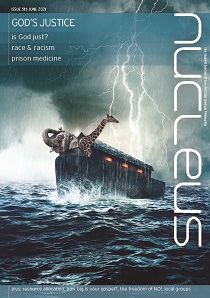the freedom of no
One of the most profound leadership lessons I have learnt is the ability to say no. In fact, the mark of your leadership, both of yourself and others, is not what you say yes to. It is what you say no to. Saying no is incredibly liberating, both for us but also for the people who ask us. We must remember that whenever we say 'yes' to one thing we are saying 'no' to something else. That might be another opportunity, our work, a relationship, sleep, rest, or time with God. When we don't say no, we risk several things: burnout, cheating others out of time with us and cheating ourselves from working to the priorities God has called us to.why is it so hard to say no?
Medics are often asked to do all sorts of things because we are generally responsible, personable and capable. Saying no is difficult for several reasons. Firstly, these are often great opportunities and something we could add value to. Secondly, saying no risks disappointing others or getting into conflict. It can hurt our pride to admit our limitations in a culture that so values activity and productivity. We can 'fear man' and how we are perceived more than we might fear God. [2] Finally, we struggle personally because we often don't have a clear idea of how to prioritise what is more or less important. This results in us reacting to opportunities rather than proactively responding. Whilst difficult, it can be kindest — both to ourselves and others — to say no.what would Jesus do?
Jesus is a great example of someone who knew his priorities. His life was framed by the 'Nazareth Manifesto':'The Spirit of the Lord is on me, because he has anointed me to preach good news to the poor. He has sent me to proclaim freedom for the prisoners and recovery of sight for the blind, to set the oppressed free, to proclaim the year of the Lord's favour.' (Luke 4:18-20).
Despite this, everyone had their own agenda for Jesus. Crowds kept trying to make him king; others wanted him to lead a revolution; the Pharisees wanted him to stop his ministry; those who were sick demanded healing; people followed him around even when he was exhausted. Despite others seeking to control his priorities and at times even threatening him, [3] Jesus resisted these demands. He restated his priority to preach [4] and to spend time with his father, withdrawing to a quiet place to pray. [5] We too must be ready to challenge the expectations people have of us and be ready to help them understand our Christ-centred priorities. [6]
how do you fill your jar?
A helpful analogy here is considering how to optimally fill a jar with rocks, stones and sand. Jesus lived a full life, [7] saying yes to many things, and yet he was very deliberate in what and whom he said yes to. He knew in which order he filled his 'time jar'. These key priorities — or rocks — for us are often core commitments like family, [8] studies [9] and regular worship. [10] Every six months I review my priorities around the responsibilities he has given me: My list consists of: relationship with God, personal life/health, relationships (family, friends), church, and work. Yours will of course include your studies and maybe other things.
For each of my five responsibilities, I have a verse and a mission statement that is personal to me. For 'relationship with God' my verse is Galatians 4:6-7. My mission statement is 'I am a son, not a slave. I am a friend of God and want to cultivate a friendship relationship with him. I practice thankfulness and bring my worries and thoughts to him daily.' I then make a series of commitments which are priorities for me. These are my 'rocks' and include: my phone is off at 9.30 pm and on at seven am; I spend time daily with God when I wake up; my focus is on enjoying time with God more than ticking boxes. I know that if I do not do these things the rest of life won't go too well.
Another example is in 'personal/health'. My verse is Psalm 139:17-18 with the mission statement 'I am a human being lovingly created in God's image and am supremely valuable. But I have limits I need to respect. I show self-control and am able to rest and relax, understanding my identity comes from my acceptance from God.' My commitments include: I sleep an average of eight hours every night; I exercise four days each week; I eat healthy portion sizes and maintain my weight. Again, I know that when I start saying yes to things that mean saying no to these commitments, life doesn't go well. [11]
how do I say no for myself?
When someone asks me to say yes to a new thing I will often respond in three ways. Firstly, thank them. 'Thanks for asking, I can see this is an important and significant work.' Second, defer. Rather than a reflex 'reactive' response I might say, 'could you email me with more details?' Or I might say 'to say yes to this I'd need to say no to something else in my schedule. I need to consider that'. I will then seek to pray about it, consider my commitments in the season of life I am in, probe my motives, seek wise counsel and work through the implications of a new 'yes' in my life. Thirdly, respond. We must honour people with a response rather than go quiet on them. A clear 'no' means they can ask someone else who might be just the right person for the role. So much time and energy can be wasted through procrastination and a lack of clear communication.how do I say no to others?
Finally, there are times when we need to extend the 'freedom of no' to those we lead. Take for example the person who wants to be in your worship band. They clearly have a voice that isn't the best. You want to encourage them, but you know you shouldn't say yes! However in my experience most people say yes, which makes the job of saying no later all the more difficult.
This confusing of 'nice' with 'no' does people a disservice. A gentle 'no' [12] can save months and even years of pain from being in the wrong place when they could be far more effective doing something else. I will often start by helping people say no for themselves. For example, I might say 'if you were to lead worship alone without any experience it could put you in a very challenging situation'. You might also use their words: 'You just shared that you are currently busy with no time to rest. Doing this might place you in a bad situation. Does that make sense?' Further, ensuring you have a culture of review and feedback builds in times when we can say no. It is important for our leadership that both we and those we lead have planned times to check in on how we are doing, receive feedback and have the opportunity to renew our yes or freely express a no.
So, I'll continue to enjoy my Jim Carrey films. And whilst I don't want to be known as 'Dr No', my days of being a 'yes man' are over. How about you?
John Greenall is CMF Associate CEO and a paediatrician in Bedfordshire
A Portuguese version of the article is available on the website of our sister fellowship, AEMC
































